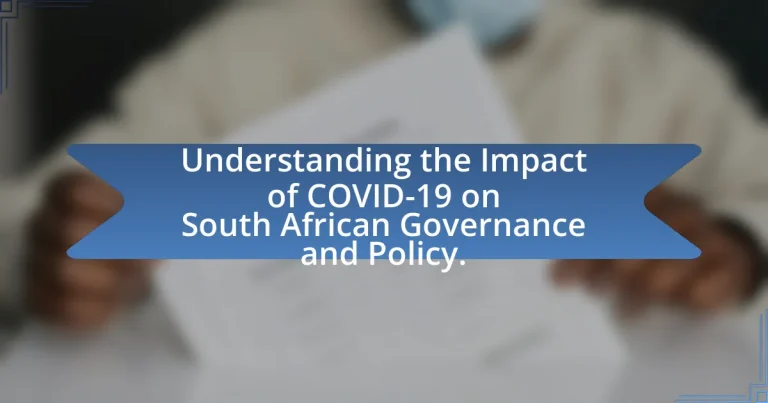The article examines the significant impact of COVID-19 on governance and policy in South Africa, highlighting the implementation of emergency regulations and a shift in public health priorities. It discusses the enactment of the Disaster Management Act, the establishment of the National Coronavirus Command Council, and the reevaluation of healthcare policies aimed at improving infrastructure and access. Key areas affected include public health, economic recovery, education, and social welfare, with a focus on the government’s adaptation of strategies, public communication effectiveness, and the role of civil society organizations. The article also explores the evolving relationship between the government and citizens, public perceptions of government actions, and the lessons learned for future governance strategies.

What is the Impact of COVID-19 on South African Governance and Policy?
The impact of COVID-19 on South African governance and policy has been significant, leading to the implementation of emergency regulations and a shift in public health priorities. The South African government enacted the Disaster Management Act, which allowed for strict lockdown measures and the reallocation of resources to combat the pandemic. This response included the establishment of the National Coronavirus Command Council to coordinate efforts, reflecting a centralized approach to governance during the crisis. Additionally, the pandemic prompted a reevaluation of healthcare policies, emphasizing the need for improved healthcare infrastructure and access. The economic fallout from COVID-19 also led to policy adjustments aimed at economic recovery, including stimulus packages and support for vulnerable populations. These changes illustrate a transformative period in South African governance, driven by the urgent need to address both public health and economic challenges.
How has COVID-19 influenced the governance framework in South Africa?
COVID-19 has significantly influenced the governance framework in South Africa by accelerating the adoption of digital governance and emergency powers. The South African government implemented the Disaster Management Act, which granted it extensive powers to manage the pandemic, including lockdown measures and restrictions on movement. This shift highlighted the need for rapid decision-making and adaptability in governance, as evidenced by the establishment of the National Coronavirus Command Council to coordinate the response. Furthermore, the pandemic prompted increased transparency and public engagement through digital platforms, as seen in the government’s use of online briefings and social media to communicate updates. These changes reflect a broader trend towards modernizing governance practices in response to crises.
What changes were made to existing policies in response to the pandemic?
In response to the pandemic, South Africa implemented significant changes to existing policies, including the introduction of stricter health regulations and economic relief measures. The government enforced lockdowns, which altered labor policies to accommodate remote work and protect jobs, while also expanding social grants to support vulnerable populations. Additionally, the National Disaster Management Act was activated, allowing for rapid resource allocation and emergency procurement processes to address health needs. These policy adjustments were aimed at mitigating the pandemic’s impact on public health and the economy, reflecting a shift in governance priorities during the crisis.
How did the government adapt its governance strategies during the crisis?
The government adapted its governance strategies during the crisis by implementing a centralized decision-making approach and enhancing digital communication channels. This shift allowed for rapid responses to emerging challenges, such as the need for public health measures and economic support. For instance, the South African government established the National Coronavirus Command Council to coordinate the national response, which facilitated timely policy adjustments based on real-time data and expert advice. Additionally, the use of digital platforms for public communication increased transparency and engagement, helping to disseminate critical information regarding health guidelines and government initiatives effectively.
What are the key areas of policy affected by COVID-19 in South Africa?
The key areas of policy affected by COVID-19 in South Africa include public health, economic recovery, education, and social welfare. Public health policies were rapidly adjusted to manage the pandemic, including the implementation of lockdowns, health protocols, and vaccination campaigns. Economic recovery policies focused on stimulus packages and support for businesses and individuals impacted by the pandemic, with the South African government allocating approximately R500 billion for economic relief measures. Education policies were transformed to accommodate remote learning and address the digital divide, as schools closed for extended periods. Social welfare policies were also impacted, with increased support for vulnerable populations through food assistance and social grants to mitigate the effects of the crisis.
How has public health policy evolved due to the pandemic?
Public health policy has evolved significantly due to the pandemic, with a focus on enhancing preparedness and response mechanisms. Governments have implemented stricter health regulations, increased funding for healthcare systems, and prioritized vaccination campaigns to mitigate the spread of COVID-19. For instance, South Africa’s National Health Act was amended to allow for rapid deployment of resources and coordination among health agencies, reflecting a shift towards a more centralized and responsive public health framework. Additionally, the pandemic has prompted the integration of technology in health monitoring and data collection, exemplified by the use of mobile applications for contact tracing and health status reporting. These changes underscore a broader commitment to improving public health infrastructure and ensuring better resilience against future health crises.
What changes occurred in economic policy as a result of COVID-19?
COVID-19 prompted significant changes in economic policy, particularly in South Africa, where the government implemented measures to mitigate the pandemic’s impact. These changes included the introduction of the Economic Stimulus Package, which allocated R500 billion to support businesses and individuals affected by the crisis. Additionally, the South African Reserve Bank cut interest rates to a historic low of 3.5% to encourage borrowing and spending. Fiscal policies were adjusted to increase social grants and provide relief to vulnerable populations, reflecting a shift towards more interventionist economic strategies. These measures aimed to stabilize the economy and support recovery during an unprecedented public health crisis.
What role did public communication play in governance during COVID-19?
Public communication was crucial in governance during COVID-19 as it facilitated the dissemination of vital health information and guidelines to the public. Effective communication strategies, such as regular updates from government officials and health authorities, helped to inform citizens about safety measures, vaccination campaigns, and changes in regulations. For instance, the South African government utilized platforms like social media, press briefings, and community outreach to ensure that accurate information reached diverse populations, thereby combating misinformation. This approach was supported by studies indicating that transparent communication significantly influenced public compliance with health directives, ultimately aiding in the management of the pandemic’s impact on society.
How effective was the government’s communication strategy?
The government’s communication strategy during the COVID-19 pandemic in South Africa was largely effective, as evidenced by the high levels of public awareness regarding health protocols and vaccination campaigns. Surveys conducted by the Human Sciences Research Council indicated that over 80% of South Africans were aware of the government’s COVID-19 regulations and guidelines. Additionally, the use of multiple platforms, including social media, television, and radio, facilitated widespread dissemination of information, contributing to a significant increase in public compliance with health measures.
What impact did misinformation have on public compliance with policies?
Misinformation significantly undermined public compliance with COVID-19 policies in South Africa. Studies indicated that false information regarding the virus’s transmission and prevention led to confusion and skepticism among the population, resulting in lower adherence to health guidelines. For instance, a survey conducted by the South African Medical Research Council found that 60% of respondents believed misinformation about COVID-19, which directly correlated with reduced compliance to mask-wearing and social distancing measures. This decline in compliance not only hindered efforts to control the virus’s spread but also complicated the government’s ability to implement effective public health strategies.

How did COVID-19 affect the relationship between government and citizens in South Africa?
COVID-19 significantly strained the relationship between the South African government and its citizens. The government’s implementation of strict lockdown measures and regulations, such as the Disaster Management Act, led to widespread public discontent and protests, as many citizens felt their freedoms were being curtailed. Reports indicated that the police and military enforced these regulations with excessive force, which further eroded trust between the government and the populace. Additionally, the government’s handling of social relief measures, which were criticized for being slow and inadequate, highlighted systemic issues in governance and exacerbated feelings of alienation among citizens. These factors collectively contributed to a more adversarial relationship, as citizens increasingly questioned the government’s transparency and accountability during the crisis.
What were the public’s perceptions of government actions during the pandemic?
Public perceptions of government actions during the pandemic in South Africa were largely critical, with many citizens expressing dissatisfaction regarding the effectiveness and transparency of the government’s response. Surveys conducted by the Human Sciences Research Council indicated that approximately 60% of respondents felt that the government’s communication was inadequate, leading to confusion and mistrust. Additionally, a significant portion of the population, around 70%, believed that the government’s economic relief measures were insufficient to address the hardships faced by many households. These perceptions were influenced by factors such as inconsistent messaging, perceived corruption, and the socioeconomic impact of lockdown measures, which fueled public frustration and calls for accountability.
How did trust in government change throughout the crisis?
Trust in government in South Africa fluctuated significantly throughout the COVID-19 crisis. Initially, there was a surge in trust as the government implemented strict lockdown measures and communicated effectively about the pandemic, leading to a 70% approval rating for President Cyril Ramaphosa in April 2020. However, as the crisis progressed, trust began to decline due to issues such as corruption scandals related to COVID-19 relief funds and perceived mismanagement of resources, resulting in a drop to approximately 50% by late 2021. This decline was evidenced by public opinion surveys indicating growing dissatisfaction with government responses and transparency.
What were the major public responses to government policies?
Major public responses to government policies during the COVID-19 pandemic in South Africa included widespread protests, compliance with health regulations, and public discourse on economic impacts. Citizens expressed dissatisfaction through protests against lockdown measures, highlighting concerns over economic hardship and civil liberties. Simultaneously, many South Africans adhered to health protocols, such as mask-wearing and social distancing, reflecting a commitment to public health. Additionally, public discussions and debates emerged regarding the effectiveness of government interventions, with various stakeholders, including civil society organizations, advocating for transparency and accountability in policy implementation. These responses illustrate the complex interplay between public sentiment and government actions during the crisis.
How did civil society organizations respond to COVID-19 governance challenges?
Civil society organizations responded to COVID-19 governance challenges by actively engaging in advocacy, providing essential services, and holding governments accountable. For instance, organizations like the South African Human Rights Commission monitored the government’s response to ensure compliance with human rights standards, while others distributed food and health supplies to vulnerable communities. These actions were crucial in addressing gaps in government response, as evidenced by reports indicating that civil society played a vital role in mobilizing resources and disseminating information during the pandemic.
What initiatives were launched by NGOs to support affected communities?
NGOs launched various initiatives to support affected communities during the COVID-19 pandemic in South Africa. These initiatives included food distribution programs, mental health support services, and educational resources for remote learning. For instance, organizations like Gift of the Givers provided food parcels to vulnerable families, while others focused on mental health awareness campaigns to address the psychological impact of the pandemic. Additionally, NGOs collaborated with local governments to ensure access to healthcare services, including COVID-19 testing and vaccination drives, thereby reinforcing community resilience during the crisis.
How did civil society influence policy decisions during the pandemic?
Civil society significantly influenced policy decisions during the pandemic by mobilizing public opinion, advocating for vulnerable populations, and holding the government accountable. Organizations and grassroots movements in South Africa, such as the Treatment Action Campaign, played a crucial role in demanding equitable access to healthcare and resources, which led to policy adjustments that prioritized marginalized communities. For instance, civil society’s pressure resulted in the government implementing measures to ensure that COVID-19 testing and treatment were accessible to all, particularly in underserved areas. This influence was evident in the establishment of the National Coronavirus Command Council, which included civil society representatives to ensure diverse perspectives were considered in decision-making processes.

What lessons can be learned from the governance response to COVID-19 in South Africa?
The governance response to COVID-19 in South Africa highlights several key lessons, including the importance of clear communication, the need for agile policy-making, and the value of collaboration between government and civil society. Clear communication was essential in disseminating health guidelines and ensuring public compliance, as evidenced by the government’s use of various media platforms to reach diverse populations. Agile policy-making allowed for rapid adjustments to regulations in response to changing circumstances, demonstrating the necessity of flexibility in governance during crises. Collaboration with civil society organizations facilitated the distribution of aid and resources, showcasing how partnerships can enhance the effectiveness of government responses. These lessons underscore the critical role of effective governance in managing public health emergencies.
What best practices emerged from the South African government’s response?
The South African government’s response to COVID-19 highlighted several best practices, including effective communication, collaboration with health experts, and the implementation of targeted interventions. Effective communication involved transparent updates and public health messaging that fostered trust and compliance among citizens. Collaboration with health experts ensured that decisions were informed by scientific evidence, leading to more effective health policies. Targeted interventions, such as localized lockdowns and resource allocation to high-risk areas, demonstrated adaptability and responsiveness to the evolving situation. These practices contributed to a more coordinated and effective public health response during the pandemic.
How can these practices inform future governance strategies?
Practices developed during the COVID-19 pandemic can inform future governance strategies by highlighting the importance of adaptability and responsiveness in policy-making. For instance, the rapid implementation of digital platforms for service delivery demonstrated how technology can enhance efficiency and accessibility in governance. Evidence from the South African government’s use of online systems for health services during the pandemic shows that such innovations can lead to improved citizen engagement and streamlined processes. Additionally, the emphasis on data-driven decision-making during the crisis underscores the need for robust data collection and analysis frameworks in future governance strategies, ensuring that policies are informed by real-time information and public health metrics.
What are the potential long-term impacts on South African governance?
The potential long-term impacts on South African governance include increased reliance on digital governance, shifts in public health policy, and heightened scrutiny of government accountability. The COVID-19 pandemic accelerated the adoption of digital platforms for service delivery, which may lead to more efficient governance structures in the future. Additionally, the crisis highlighted weaknesses in public health systems, prompting reforms aimed at strengthening healthcare infrastructure and emergency preparedness. Furthermore, the pandemic has intensified public demand for transparency and accountability, likely resulting in more robust mechanisms for civic engagement and oversight. These changes are supported by studies indicating that crises often catalyze significant policy shifts, as seen in various global contexts during and after health emergencies.
What recommendations can be made for improving governance in future crises?
To improve governance in future crises, South Africa should enhance intergovernmental coordination and communication. Effective governance during crises relies on clear communication channels among national, provincial, and local governments, as evidenced by the challenges faced during the COVID-19 pandemic when inconsistent messaging led to public confusion. Additionally, establishing a crisis management framework that includes regular training and simulations for government officials can prepare them for rapid response, as demonstrated by countries like New Zealand, which effectively managed its COVID-19 response through well-practiced protocols. Implementing transparent decision-making processes and engaging with civil society can also foster trust and accountability, as seen in successful governance models worldwide.
How can South Africa enhance its policy frameworks for better crisis management?
South Africa can enhance its policy frameworks for better crisis management by integrating a multi-sectoral approach that includes collaboration between government, private sector, and civil society. This approach is supported by the need for comprehensive risk assessments and the establishment of clear communication channels, which were highlighted during the COVID-19 pandemic when rapid information dissemination was crucial for public compliance and safety.
Furthermore, the National Disaster Management Act of 2002 provides a legal framework for disaster management, but its effectiveness can be improved by regularly updating response strategies based on lessons learned from past crises, such as the COVID-19 response. The South African government can also invest in training and capacity building for local authorities to ensure they are equipped to handle crises effectively.
Evidence from the World Health Organization indicates that countries with robust crisis management frameworks are better positioned to respond to health emergencies, which underscores the importance of strengthening these frameworks in South Africa.
What role should technology play in future governance strategies?
Technology should play a central role in future governance strategies by enhancing transparency, efficiency, and citizen engagement. The integration of digital platforms can streamline administrative processes, reduce bureaucratic delays, and improve service delivery, as evidenced by the South African government’s use of online systems during the COVID-19 pandemic to facilitate access to information and services. Furthermore, data analytics can inform policy decisions by providing insights into public needs and preferences, thereby fostering a more responsive governance framework. The successful implementation of technology in governance can lead to increased public trust and participation, as seen in various global examples where e-governance initiatives have empowered citizens and improved accountability.


